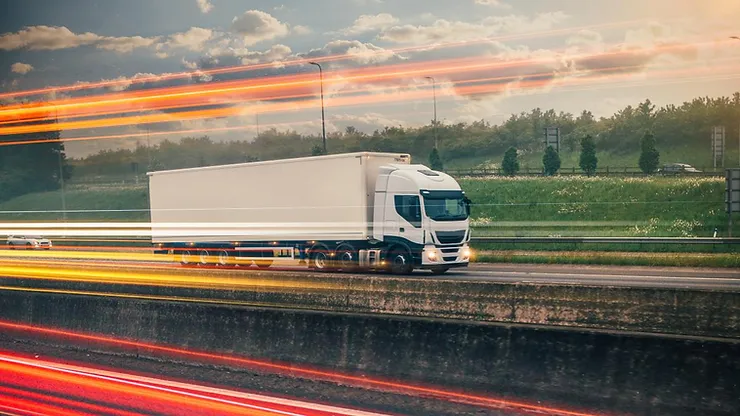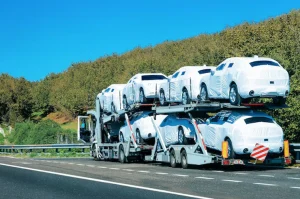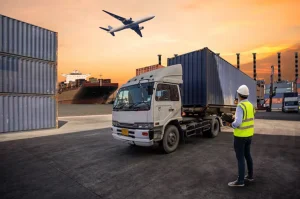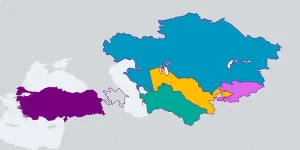Land transportation within Europe is a critical component of the continent’s logistics and supply chain network. It encompasses a wide range of goods, from simple pallets of goods to highly specialized transport of refrigerated goods.
Here’s an overview of land transportation within Europe, covering various aspects of the process:
1. Road Transportation:
-
Trucks: Road transport is the most common and versatile mode for moving goods within Europe. Trucks are used for transporting various types of cargo, from small parcels to large containers.
-
Palletized Cargo: Pallets are a common way to package and transport goods within Europe. Palletized cargo is loaded onto trucks and secured for transportation.
-
Refrigerated Transport: Refrigerated trucks, often referred to as “reefer trucks,” are used for transporting perishable goods such as food, pharmaceuticals, and chemicals that require temperature control. These trucks have insulated compartments and cooling/heating systems to maintain the required temperature.
2. Rail Transportation:
-
Europe has an extensive rail network that is used for transporting goods over long distances. Rail transport is particularly efficient for bulk goods and large volumes of cargo.
-
Some specialized rail services also offer refrigerated transport for perishable goods.
3. Intermodal Transportation:
-
Intermodal transportation involves the use of multiple modes of transport, such as trucks, trains, and ships, to move goods across Europe. This approach optimizes transportation efficiency.
-
Intermodal containers are commonly used for such transport, allowing cargo to be seamlessly transferred between different modes of transportation.
4. Pipeline Transportation:
-
Pipelines are used for transporting liquids and gases, such as oil, natural gas, and petroleum products, across Europe. This method is primarily employed in the energy sector for the distribution and transportation of resources.
5. Logistics and Warehousing:
-
Warehousing and distribution centers play a crucial role in land transportation. They serve as hubs for storing and managing goods before they are transported to their final destinations.
-
Modern logistics practices involve sophisticated systems for inventory management, order processing, and route optimization.
6. Customs and Regulatory Compliance:
-
The movement of goods within Europe involves customs and regulatory compliance. The European Union has established customs procedures and regulations to facilitate the flow of goods while ensuring safety and security.
7. Environmental Considerations:
-
In recent years, there has been a growing focus on reducing the environmental impact of land transportation. This has led to the development and adoption of cleaner and more sustainable transport options, such as electric trucks and trains.
8. Technology and Tracking:
-
Advanced technologies, including GPS tracking and telematics, are widely used to monitor the location and condition of goods in transit. This helps improve efficiency and security.
The adoption of electric vehicles (EVs) for cargo transport is growing in Europe to reduce carbon emissions and promote sustainability.
Why is it important?
Land transportation within Europe is critically important for a variety of reasons, and it plays a central role in the continent’s economy and daily life. Here are some key reasons why land transportation within Europe is essential:
-
Economic Backbone: Land transportation is the backbone of Europe’s economy. It facilitates the movement of goods and raw materials from producers to consumers, manufacturers to retailers, and businesses to markets. This movement is essential for economic growth, trade, and overall prosperity.
-
Supply Chain Connectivity: European countries rely on efficient land transportation networks to ensure the smooth functioning of supply chains. Raw materials, components, and finished products need to move seamlessly between regions and countries to meet consumer demands.
-
Trade and Export: Europe is a major player in global trade. Land transportation provides a cost-effective and efficient way to transport goods to and from ports, airports, and border crossings. This connectivity supports international trade and enhances Europe’s competitiveness in the global market.
-
Regional Integration: The European Union (EU) and other regional organizations have promoted closer economic and political integration among member states. Land transportation is vital for the free movement of goods and people within these regions, fostering economic cooperation and cultural exchange.
-
Logistics and Distribution: Efficient land transportation is essential for the logistics and distribution sectors. It enables the timely delivery of goods to retail stores, distribution centers, and customers, reducing supply chain costs and ensuring product availability.
-
Job Creation: The land transportation sector is a significant source of employment. It includes truck drivers, logistics professionals, maintenance workers, and others who contribute to the functioning of the transportation network.
Land transportation within Europe is essential for economic development, trade, and regional integration. It contributes to the region’s economic prosperity, job creation, and quality of life.
Advantages and Disadvantages
Land transportation of cargo within Europe offers several advantages, including flexibility and accessibility, but it also comes with disadvantages related to environmental impact, congestion, and infrastructure challenges. Here’s a breakdown of the key advantages and disadvantages:
Advantages:
1. Versatility and Accessibility:
-
Land transportation, especially road transport, is highly versatile and accessible, allowing cargo to reach even remote areas where other modes of transport may not be practical.
2. Speed and Timeliness:
-
Land transportation can be relatively fast for short and medium distances, providing timely deliveries, which is crucial for perishable goods and just-in-time supply chains.
3. Door-to-Door Delivery:
-
Trucks can provide door-to-door delivery services, reducing the need for transshipment and simplifying the logistics process.
4. Flexibility and Frequency:
-
Land transport services are available throughout Europe on a daily basis, providing flexibility and frequent departures, which can be critical for businesses and consumers.
5. Efficient for Short Distances:
-
For relatively short distances within a country or neighboring countries, road transport is often more cost-effective and efficient compared to other modes.
6. Customization:
-
Land transportation allows for the customization of logistics solutions, such as dedicated routes and specialized equipment for different cargo types.
Disadvantages:
1. Environmental Impact:
-
Road transportation, in particular, has a significant environmental impact due to carbon emissions and air pollution. It contributes to climate change and can harm air quality, especially in urban areas.
2. Congestion and Traffic Delays:
-
Many European cities and highways experience congestion and traffic delays, which can lead to unpredictable transit times and increased operating costs for logistics companies.
3. Limited Capacity for Long Distances:
-
Road transport becomes less efficient and cost-effective for very long distances compared to other modes like rail or sea transport.
4. Regulatory Complexity:
-
Cross-border transportation within Europe can involve navigating varying regulations, customs procedures, and tolls, which can add complexity and cost to the logistics process.
5. Limited Capacity for Bulk Cargo:
-
For the transportation of bulk commodities (e.g., coal and minerals), rail and inland waterway transport may be more efficient and cost-effective than road transport.
6. Seasonal Challenges:
-
Adverse weather conditions, such as heavy snowfall in the Alps or flooding along river routes, can disrupt land transportation and cause delays.
Land Transportation Services at Toptrans
Land transportation plays a pivotal role in the international logistics landscape, especially within Europe. The continent’s intricate network of roads, highways, and railroads facilitates the movement of goods efficiently and cost-effectively. Whether you’re a manufacturer, distributor, or importer/exporter, having a trusted partner like Toptrans can make all the difference in ensuring your cargo reaches its destination seamlessly.
Our Expertise in International Logistics
TopTrans’ dedicated team of experts understands the complexities of cross-border logistics and is equipped to handle diverse cargo types.
Comprehensive Range of Services
We offer a wide spectrum of services, ranging from standard pallet shipments to specialized refrigerated logistics. No matter the nature of your cargo, we have a solution tailored to your needs.
Types of Cargo TopTrans Handle
Simple Pallet Shipments
For businesses dealing with standard pallets of goods, our land transportation services are designed for efficiency. We provide safe and timely deliveries, ensuring your products reach their destination intact.
Refrigerated Goods and Perishables
When it comes to perishable cargo, such as fruits, vegetables, or pharmaceuticals, maintaining the cold chain is essential. Our refrigerated logistics solutions guarantee temperature control throughout the journey, preserving the quality of your goods.
Dangerous and Military Shipments
Toptrans is equipped to handle even the most challenging cargo, including dangerous and military shipments. We adhere to strict safety protocols to ensure the secure transport of sensitive materials.
Our Geographic Coverage: From Georgia to Europe
Toptrans extends its services to key European destinations, including Tbilisi, Batumi, and Poti. Our expansive network ensures that your cargo is well-connected to Europe’s major economic hubs.
Transparent Pricing
We believe in transparent pricing. The final service fee is determined based on cargo characteristics, chosen routes, type of transportation, and any additional services required. You’ll always know what to expect.
Real-time Updates and Fleet Diversity
Our well-functioning update system keeps you informed about the status of your cargo throughout the journey. With a diverse fleet, we’re equipped to handle a wide range of cargo types efficiently.
Fast Quotes and Responsive Customer Service
Getting started with TopTrans is easy. You can request a quote quickly by reaching out to our responsive customer service team via phone or email. We’re here to assist you promptly and answer any questions you may have.
When it comes to land transportation within Europe, TopTrans is the name you can trust. We offer a seamless and efficient logistics experience, ensuring your cargo reaches its destination safely and on time. Partner with us and experience the TopTrans advantage for yourself. Your satisfaction is our ultimate goal, and we’re dedicated to helping you succeed in the global marketplace.








